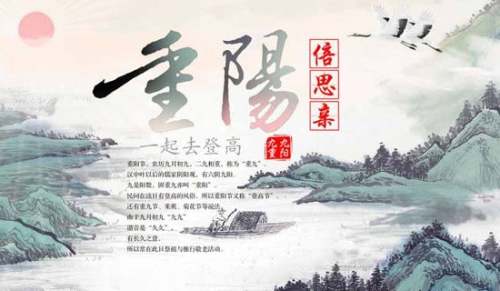- 相关推荐
重阳节的由来英语简介
农历九月九日,为传统的重阳节。重阳节的由来用英语怎么介绍?大家不妨来看看小编推送的重阳节的由来英语简介,希望给大家带来帮助!

The Double Ninth Festival is one of the oldest traditional festivals in our country, and it is gradually known by people. Why is the lunar September 9th called Chongyang? That is because the ancients to “ Yang Yao was nine ” ” &rdquo, nine; as a positive number, 29 by weight of “ or ”; the sun and the moon, the sun is heavy, named &ldquo &rdquo, also known as Chongyang;; “ or &rdquo in September nine,; “ ” “ nine, ”.
There are many customs, and what a local customs are not the same, such as climbing, chrysanthemum, drink chrysanthemum wine, hairpin ed chrysanthemum, eating double ninth cake, wearing dogwood, kite flying. But one thing is the same, that is, it is our traditional day of respect for the elderly. All over the country, the Double Ninth Festival evolved into “ the mountaineering Festival ” “ chrysanthemum Festival ” “ dogwood Festival ” “ picnic Festival ” “ daughter Festival ” and so on. These terms are named after the contents or themes of the festival.
When the Chongyang Festival came into being, there is no final conclusion in the academic circle. It is generally believed that the individual festival custom of the Double Ninth Festival began to appear in the pre Qin period, and came into being formally during the Eastern Han dynasty. Its production is closely related to agricultural production. First of all, from the time point of view, after the ancient ancestors of the astronomical point on the summer solstice and the winter solstice, we must choose the middle point between the two solar term and Shangsi Festival and festival has appeared, and finally fixed in March three and September nine. In addition, ancient Chinese ancestors regarded the big Mars as the incarnation of the God of fire.
By September, Mars retired, which not only has always been to Mars for seasonal production and life of the ancients identifies the lost time coordinates, but also make the Mars will make a fetish of creating a sense of fear, it will think the evil spirit, and to ward off evil, and it will be reflected in the Chongyang in the festival. Secondly, from the perspective of phenology, lunar September, farming in most regions of China has been completed, farmers need to harvest.
"Lu Ji Qiu Ji" set: September “ life Zhongzai, farming land preparation, give five to hide from God Emperor to warehouse, only to be ordered. ” “ is a month, to the emperor, to prepare for the taste of sacrifice. ” although the historical data available, but we can still conclude that: a variety of pre Qin Dynasty has long been popular in the September harvest celebration, to the Eastern Han Dynasty have a fixed date — — in September nine, and the festival. Again, from a climate perspective, September The sky is clear and bright. dry climate. Because of the emergence of Taoism in the Eastern Han Dynasty, various mysterious concepts, rituals, legends and ancient customs infiltrated, and the climate in September 9th had a new explanation. One explanation is that people think that the day was higher, the higher sewage sink, fresh air, gathered more, to go up naturally can take in the heaven, resulting in the Double Ninth Festival high customs. Subjectively, climbing the plateau is to seek immortality and ascension, but in fact it is impossible, so seek immortality. Heaven ascended to life. This became an important theme of the traditional double ninth festival. Another explanation is that people think that the weather in September from warm to cold, prone to epidemic.
Because of the low level of science, mistakenly thought it was somewhere in the existence of ghosts caused by evil forces, resulting in a way to Huan Jing legend as the representative of the evil trend Kyrgyzstan, to ascend and wear cornel has become the main ancient festival customs.
The Double Ninth Festival came into being in the Eastern Han Dynasty, established in the Six Dynasties and reached its peak in the Tang and song dynasties. In the long tradition of the process, it has undergone several changes, coupled with a variety of Folk Factors and mysterious mathematical logic, the ritual festival gradually transformed into entertainment festival, and show people of different historical periods of lifestyle, psychological characteristics, thinking habits, aesthetic taste and values, thus forming a rich colorful cultural festival.
As for the folk culture value of Chongyang Festival, there are three points worth emphasizing.
First, the Chongyang folk culture has a strong heritage and regional characteristics. They complement each other, closely around from disasters, health and longevity, enterprising on this theme, once a year in the Chongyang Festival atmosphere, build a rich and colorful Chinese national feelings.
Second, Huan Jing learn to avoid the disaster, is a mystery, but he has made the concrete behavior ascend to practice, resulting in the formation of the Chinese nation to physical health, disease prevention and removing disease for the purpose of start climbing folk. He showed the truth to the world: the disaster is not terrible, the evil has no fear, only the courage to climb forward, believe in themselves, dare to resist people, in order to pursue the value of life and a better future.
Third, Chongyang beyond the basic connotation of popular folk culture in the process of evolution, with the national culture perfect, its cultural connotation but also has a leap and sublimation, derived the elegant culture phenomenon of literati, scholar and literati borrowed Chongyang lyrical expressiveness. They left many immortal lines masterpieces, has been one of competing.
翻译
重阳节是我国历史最悠久的传统节日之一,它也逐渐的被人们所熟知。为什么把阴历九月九日叫做重阳呢?那是因为,古人“以阳爻为九”,将”九”定为阳数,两九相重为“重九”;日月并阳,两阳相重,故名“重阳”,又名“重九”、“九月九”、“九日”。
重阳节的习俗有很多,而且么一个地方的习俗都不太一样,如登高、赏菊、饮菊花酒、簪插菊花、吃重阳糕、佩带茱萸、放风筝等。但有一点是相同的,那就是它还是我国传统的敬老节。各地还把重阳节衍化为“登山节”、 “菊花节”、“茱萸节”、“野餐节”、“女儿节”等等。这些叫法,均由节日的活动内容或主题而得名。
重阳节究竟起源何时,学术界尚无定论。一般认为,重阳节的个别节俗在先秦时期已经初露端倪,至东汉时期正式产生。它的产生,与农业生产密切相关。首先,从天候上看,古代先民确定了天文点上的冬至和夏至之后,就要选择两个节气之间的中间点,于是,上巳节和下巳节就出现了,最后定格在三月三和九月九。另外,我国古代先民把大火星看做火神的化身。
到了九月,大火星退隐了,这不仅使一向以大火星为季节生产和生活标识的古人失去了时间的坐标,同时也使将大火星奉若神明的古人产生莫名的恐惧,以为邪祟将与之俱来,因而产生辟邪的要求,并将它在重阳节俗中体现了出来。其次,从物候上看,农历九月,我国大部分地区农事已毕,农民需要庆丰收。
《吕氏春秋季秋纪》载:九月“命冢宰,农事备收,举五种之要,藏帝籍之收于神仓,祗敬必饬。” “是月也,大飨帝,尝牺牲,告备于天子。”尽管史料阙如,但我们仍然可以断定:先秦时流传已久的各种九月丰年庆祝活动,到东汉时有了一个固定的日期——九月九,因而实现了节日化。再次,从气候上看,九月天清气朗,气候干燥。由于东汉时道教产生,各种神秘观念、仪式、传说和古老风俗的渗入,对九月九日的气候便有了新的解释。一种解释是,人们以为这一天清气上扬,浊气下沉,地势越高,清气聚集得越多,登临高处自然就可以乘清气而升天,由此产生了重阳节登高的习俗。从主观上讲,登高原是为了求仙和升天,但这在事实上是不可能的,于是求仙。升天便转为祈寿。这成了传统重阳节的一个重要主题活动。另一种解释是,人们认为九月天气由暖转寒,容易发生时疫。
由于当时科学水平较低,误以为是冥冥中存在的鬼魅邪祟势力所致,因而产生了以桓景学道的传说为代表的避邪趋吉的要求,从而登高和佩插茱萸就成为古代重阳节的主要习俗。
重阳节在东汉产生,在六朝定型,在唐宋达到鼎盛。在漫长的传续过程中,它几经嬗变,耦合了多种民俗因素和神秘的数理逻辑,将仪式型的节日逐渐转变为娱乐型的节日,并且表现出不同历史时期人们的生活方式、心理特征、思维习惯、审美情趣和价值观念,因而形成了丰富多彩的重阳文化。
就重阳的民俗文化价值而言,有三点值得强调。
其一,重阳民俗文化具有极强的传承性和地域特征性。他们相辅相成,紧紧围绕避祸消灾、健康长寿、进取向上这一主题,在一年一度的重阳节日氛围中,构建出极其丰富多彩的中华民族情愫。
其二,桓景的学道避灾,虽带有神秘色彩,但他把登高作为具体行为去实践,从而形成了中华民族以强身健体、防病祛疾为目的的登高民俗的开端。他向世人展示这样一个道理:灾难不可怕,邪恶无所惧,只有勇于攀登进取、相信自我、敢于抗争的人,才能追求到生命的价值和美好的未来。
其三,重阳在演变过程中超越了大众民俗文化的基本内涵,随着民族文化的日臻完美,其文化内涵也产生着质的飞跃与升华,派生出历代文人、学者、士大夫借重阳日抒情达意的高雅文化现象。他们留下了许多不朽的佳句名作,至今仍被人们争相传诵。
【重阳节的由来英语简介】相关文章:
重阳节由来简介07-05
重阳节的由来及习俗简介07-02
元宵节的由来英语简介07-02
冬至的由来简介10-25
立夏的由来简介07-05
除夕的由来和风俗简介03-31
元旦的由来简介02-06
元宵节由来简介11-01
清明节的由来及简介07-01
平安夜的由来简介07-02